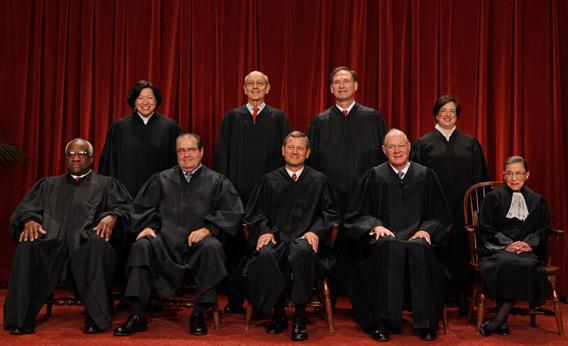“A Moment of Silence for Obmacare: Prayers, depression, and Latin phrases. Obamacare looks to have had another very bad day,” by Dahlia Lithwick. Lithwick’s daily dispatches from the Supreme Court’s ACA hearings did not paint an optimistic picture for Obamacare supporters. Also, Akhil Reed Amar describes what Solicitor General Donald Verrilli should have said in his arguments before the Supreme Court justices. And Maryland’s health secretary shares a day in his life trying to implement Obamacare in the state. Read all of Slate’s coverage of the ACA hearings at the Supreme Court.
“Do Childish People Write Better Children’s Books? The soothing anthem Goodnight Moon was written by someone so restless,” by Katie Roiphe. It turns out that the author of a classic children’s book was not “the plump, maternal presence” we might have imagined her to be. Instead, Margaret Wise Brown led an eccentric, whimsical, and sometimes troubled life. Roiphe asks, “Is it possible that the most inspired children’s book writers never grow up?”
“Hemings and Jefferson Together Forever? Troubling cases of Mormon ‘proxy sealing,’ ” by Max Perry Mueller. Members of the Church of Jesus Christ of Latter-day Saints conducted a posthumous marriage for Thomas Jefferson and Sally Hemings, his slave and mother of several of his children. Mueller raises several other cases of slaves being sealed in an eternal relationship with their masters and says, “Sealing a slave master to his slave is at least as troubling as the baptism of Holocaust victims, the practice of which the LDS Church has officially condemned.”
“What’s Obama’s Nuclear Endgame? Obama told Medvedev that he’ll have more ‘flexibility’ to deal with nukes after November. What could he possibly mean?” by Fred Kaplan. President Barack Obama was caught on an open mic this week discussing U.S.-Russian nuclear relations with Russian President Dmitry Medvedev, leading to a conservative kerfuffle. Kaplan explains what Obama might have meant by “flexibility” and why Republicans are blowing the situation out of proportion.
“How Much Gold Is Game of Thrones Worth? How does HBO make money on expensive shows only 3 million people watch?” by June Thomas. Thomas says that selling subscriptions and DVDs and creating original, niche shows that don’t have to cater to advertisers keeps HBO and other premium channels afloat.
“Google’s Grand Plan: The search company no longer dabbles in exotic ideas. Now, it’s all business,” by Farhad Manjoo. Manjoo says that since Larry Page returned as Google’s CEO, “Google is now a bolder, more disciplined, more ferocious combatant in the Valley’s tech wars.” And he garners four insights from a Google insider on the internet giant’s determined new path.
“A Drunkard in the Gutter Is Just Where He Ought To Be: Meet the man who invented the GOP’s defense of the wealthy—in 1883,” by Beverly Gage. Rick Santorum’s defense of income inequality in the U.S. is hardly a new thing, Gage points out. One of its early champions was an ex-Episcopalian priest turned Yale sociologist who “was unabashed in his admiration for millionaires, and indignant at criticism lobbed in their direction,” yet also championed what he called “The Forgotten Man.”
“Mother Country: The perils of getting an assist abroad on having a baby—for Americans and foreigners both,” by Sarah Elizabeth Richards. Richards writes about how IVF is complicating citizenship issues for babies with nontraditional origins. And there are no standardized laws on the horizon to fix the problem.
The Slate Book Review returns withreviews of Julie Berebitsky’s Sex and the Office: A History of Gender, Power, and Desire, Rachel Maddow’s Drift, and Mark Leyner’s The Sugar Frosted Nutsack.
